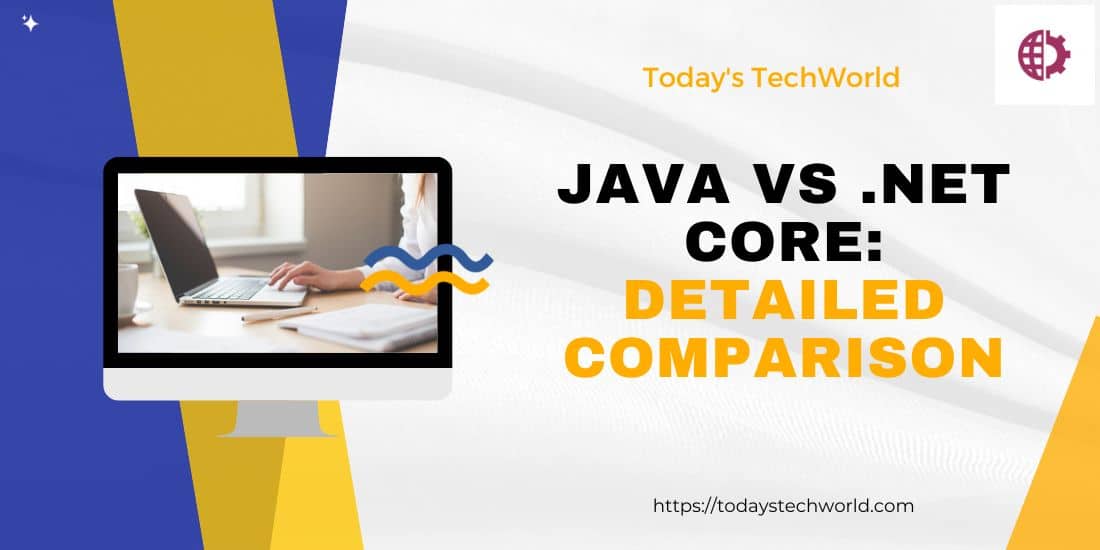Here in this article we will discuss Java vs .Net Core in detail and help you understand their primary differences.
With technological evolution, there are chances of prioritizing the technology that you will use for your software development. There were days when only a few technologies were available for software development. But now, the case is completely reversed. Various technologies are available, and it isn’t easy to choose the best from them. The same happens when deciding between Java vs .Net Core.
Both frameworks are used for building robust apps and software. However, they have unique features and specialties. Based on your project requirements and the development team’s expertise, you can pick any one from them.

We will discuss Java vs .Net Core in detail but first let’s begin with understanding Java first!
Contents
What is Java?
Java is a leading and popular programming language recognized globally. Although it was released in 1996, it is still used in full-fledged and ranks in the top ten programming languages used worldwide.
Interestingly, Java is easier to learn than many other modern programming languages. Developers write one source code, and it is converted into bytecode and it can be executed on any device that has JVM (Java Virtual Machine) in it. So, it is like writing once, running anywhere.
Java programming language is a multiplatform language that is preferred by software developers because of its simplicity, active user and support community, and security. It is generally used for desktop, mobile, and web development, analytics, app servers, IoT, and AI.
What is .Net Core?
.NET was introduced in 2002 by Microsoft and it was made available for MS product users only. Earlier, this framework was a closed-source platform, and it didn’t allow developers to code or execute any app on Android, iOS, or Linux platforms.
As there was restricted usage in the past, various companies didn’t get a chance to acknowledge the .NET framework. Then in 2016, Microsoft released .NET Core which changed the perception of using this language. Currently, .NET has become a good competitor of Java language, and many organizations are efficiently using this framework for different software development.
Today, there are many versions of .NET available in the market, and all of them are compatible with major operating systems. There are simultaneous tools and add-ons available along with .NET. It is also compatible with languages like C#, F#, C++, etc.
Java vs .NET Core: Primary Similarities
Technologies and preferences evolve with time. The programming languages change when the organization chooses to expand its software and technical capabilities.
In some cases, deciding between two popular programming languages is getting tough. The same situation arises when one has to choose between .NET core vs Java. Here are some similarities between these frameworks:
Both frameworks are OOP based and also assist you with enterprise-level development for developing almost all types of apps. The modular structure code gives flexibility, easy debugs, and also reusing the code. These platforms are perfect for working with enterprise architectures and high-load projects.
Here are some famous companies that use Java or .Net for their core functionalities:
.NET- Intel, Dell, Microsoft, StackOverflow, etc.
Java- Netflix, Google, Spotify, Instagram, eBay, LinkedIn, etc.
Java vs .NET Core: Primary Differences
Here’s a list of some basic differences between Java and Dot Net Core:
Primary factor
.NET was developed by Microsoft in 2002, and Java was developed by James Gosling and launched by Sun Microsystems in 1995.
Language Support
Java Native Interface or JNI feature helps Java to integrate various languages. In regards, there is another language- Kotlin that has gained a lot of fame, and it is also compatible with Java. So, this compatibility allows developers to build projects in Java and Kotlin simultaneously without any hassle. Ultimately you can minimize making losses in traditional Java apps by adding new Kotlin functionalities in it.
On the other hand, .NET Core supports 20 various languages like C++, C#, VB.NET, F#, and many more. So, developing an enterprise app with ASP.NET Core language gives the app flexibility and makes it efficient.
Operating Systems and Fundamentals
Java language works curiously and it compiles into bytecode and can run on any device having JVM installed. This means WAR (Right Once, Run Anywhere)
This framework is utilized for developing apps for different industries like eCommerce, IoT, Big Dara, stock trading, and many more. The primary benefits of Java include an easy learning curve, open-source, huge community support, etc.
Whereas, with .NET framework and the latest version of this framework has many features useful for developing web apps, mobile apps, cloud apps, etc. This platform is cross-platform, open-source, and requires no licensing expenses.
.NET follows an OOP approach and basic.NET tools, add-ons, third-party tools, and .NET libraries, are also available for developing programs for instant use. Moreover, it has proven that .NET has become a serious competitor of the Java language. Moreover, Java and .NET can utilize both Windows and Linux as the servers.
IDEs (Integrated Development Environments)
IDE is software that is used to provide crucial tools and support to the developers for building and testing different apps. Java language uses four basic IDEs like Oracle JDeveloper, Oracle NetBeans, Eclipse, and IntelliJ. These tools offer resources like a compiler, debugger, elements, and code editor that helps developers to write lines of code easily.
Meanwhile, Visual Studio is a default IDE for developing .NET apps which provides many features like language-specific envs. One can use .NET IDE like an alone workspace with multiple document interfaces which helps various development tasks like editing, compiling, and many more.
.Net Core vs Java: Core Comparison Factors
Here are some core comparison factors between Java and .NET:
Performance
For a longer time, there wasn’t much difference in the performance factor of .NET apps and Java apps. Although Microsoft has now improved a lot in .NET, the decision between Java and dot NET cannot be taken alone based on performance factors.
Security
When it comes to security, both Java and .NET Core are good alternatives. These platforms allow developers to sign the code and run it in the sandbox environment.
There were certain security issues with Java language in the past, because of its open-source nature. But these issues were quickly solved and strong security measures were made available for the Java users.
Moreover, when .NET Core was published, it was closed-source, and more secure than other frameworks. However, now it is also an open-source platform and hence security measures will be similar to Java. Hence, choose wisely depending on your project requirements and team expertise.
Learning Curve and Community
The learning curve of Java vs .NET is almost easier than other languages. But, some may find that .NET is comparatively easier to learn than Java programming language. This happens because Java is quite an old-school language with lots of documentation and resources to learn.
Moreover, the community support of Java is comparatively more than .NET because it was released back in 1996, and .NET was released in 2002. Also, when .NET wasn’t available, Java was utilized completely by a lot of companies. Hence, the user and support community of Java is comparatively more than .NET.
Concluding words
The debate of Java vs .NET Core remains a noteworthy topic in the world of software development. Both platforms have their strengths and weaknesses, and the choice ultimately is based on specific project requirements and developer preferences.
Java continues to be a strong and mature platform with a vast ecosystem and an enhanced presence in enterprise apps. On the other hand, .NET Core offers excellent cross-platform compatibility, streamlined development experience, and seamless integration with Microsoft technologies. Hence, you can choose any one of them for your project based on your requirements.
For more information, stay tuned with us. Happy reading!




